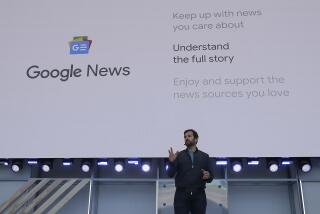MEDIA : News Organizations’ Use of Outside Research: the Inside Story : Not all the investigative legwork is being done by reporters who compile the story. The reliance on other groups’ data raises some ethical issues.
- Share via
INDIANAPOLIS — In terms of image, the Indiana Legislature had a particularly rough winter.
Starting in February, as the state’s General Assembly was moving into full swing, the local media began to criticize the way Hoosier politicians raised money and made laws. In a series called “Legislators for Sale,” the NBC-TV affiliate in Indianapolis linked last season’s campaign contributions to this year’s legislation. The Evansville Courier opined about the perils of legislative “war chests.” The Fort Wayne Journal Gazette ran a series on “the power of the purse” in state politics.
And, in a blow that many in the Republican-controlled Legislature felt was something close to political treason, the conservative Indianapolis Star-News ran the toughest stories of all--a five-part series called “Statehouse Sellout” on “how special interests hijacked the Legislature.”
This explosion of interest in Indiana’s money trail was not because of an outbreak of journalistic competitiveness or a sudden epidemic of greed in Indiana’s General Assembly. Instead, the state media tackled this issue because of outside help--a Washington-based organization that came to Indiana and computerized the state’s records of campaign contributions for the media. Instead of a mystifying flutter of 19,000 paper documents, there was one, tidy computer disk, courtesy of a private, nonpartisan organization called the Center for Public Integrity.
“It was really a key piece of the puzzle for us,” said Frank Caperton, executive editor for the Star-News. “Someday, we would have done this series alone, but the center moved it up the priority list.”
For media organizations with dwindling budgets and overworked staff, the use of data from outside groups has increasingly become a quick and easy way of beefing up news coverage.
Many network television producers and national newspapers have taken data from outside groups to bolster stories on the environment, elections and other issues in the news. Editors and writers using these stories note that the information is attributed and sometimes even double-checked before it is run.
Still, the media’s increasing use of outside investigative work has sparked an intense debate about whether it’s appropriate to add what one wag calls “muckraker helper” to the day’s stories.
“Frankly, I think it’s a shocking commentary on the default of duty by news organizations today,” said former Boston Globe editor Thomas Winship. “In many cases, it’s the real heavy lifting of journalism which they’re buying or getting for credit from the outside, instead of letting their own staff do the work.”
“Do you get any feeling at all that this is because newspapers are getting cheap?” adds Mary Dieter, the Indianapolis bureau chief for the Louisville-Courier Journal.
For many journalists, however, the outside help can make all the difference about whether a story will ever get done. Take the Western States Center, a private, nonpartisan organization that collects campaign finance data in eight Western states and either gives it or sells it to the media.
“With three people covering politics and state government for four newspapers, we simply don’t have the time to do what they do,” says Charles Johnson, state Capitol bureau chief for Lee Newspapers in Montana. “We don’t accept what they give us as whole cloth. We often use it as the basis to start working on a story, but really, we can’t match them covering an issue like campaign finance.”
Part of the reason that the media turn outside for data is the high cost of do-it-yourself investigations in the increasingly low-budget news business. It can take one or two staff members weeks of sifting through government records and then putting them onto a computer, then analyzing and massaging them to make a story understandable to the ordinary reader.
In at least some cases, the issues are so complicated that only experts can begin to understand them. And finally, the most reputable advocacy groups often know how to assemble data that news organizations feel they can trust.
One particularly successful organization has been the Environmental Working Group, an environmental advocacy organization in Washington. When the group issued a report last year on tap water, it gave local newspapers copies of the water-quality data on their area from the Environmental Protection Agency. The result was more than 1,500 news articles or television programs.
Last year, the group put out a report called “City Slickers” which documented the amount of agricultural subsidies going to people who live in cities. The report, which different media organizations used in various ways, was front-page news in the New York Times, the Los Angeles Times and the Washington Post as well as major television networks.
The group has “essentially mastered the art of getting data out of the federal government and returning it to the public who paid for it in the first place,” says Richard Wiles, its vice president for research. “If you wanted to go into this kind of research of government data, a paper would have to have a full research wing,” he added.
But while the practice may have clear benefits for news organizations, which save money; for the research organizations, which gain publicity for information they believe the public should have; and perhaps for readers as well, having outside groups perform research can open news organizations to accusations of bias.
In Indiana, for example, legislators and lobbyists accused the Center for Public Integrity and its executive director, Charles Lewis, of having a “left-wing agenda” and contributing $100,000 worth of services to the Star-News and other news organizations in order to tarnish the Republicans who control the state’s part-time, or “citizen,” Legislature.
“We call it the ‘Left of Center for Public Integrity now,” says Edward O. Roberts, one of Indiana’s most powerful lobbyists as an advocate for the Indiana Manufacturers Assn. Roberts also said he had looked up voting records of the reporters and found that “at least some of them have voted Democratic.”
“Every citizen of this state is represented by 10-15 lobbyists whether they know it or not,” Roberts said. “The part-time legislator, the average citizen can’t know about all of this stuff. I told the newspaper people, ‘If you really want the public involved, how come you devote more pages to the funnies than to the Legislature?’ ”
Larry Hansen, vice president of the Joyce Foundation, said his Midwestern-based fund donated $109,000 to Lewis’ organization as part of a four-year, $3.8-million project to “make campaign finance reform a more prominent part of the nation’s political agenda.” The money was used by the center in Indiana to create a computerized database and hold a conference last week to talk about possible ways to reform the state’s campaign laws, he said.
Lewis, Hansen and others say that whenever an organization investigates the relationship between politics and money, it most often hurts those in power because lobbyists more often contribute to those in charge.
“In these cases, it’s basically whoever’s at the top of the political food chain that looks bad, and that can be folks from either party,” said Nick Nyhart, who directs the money and politics project at the Northeast Citizen Action Resource Center in Hartford, Conn.
“Both parties really have an interest in this not being a big story,” said Nyhart, who helps journalists in his area track how their local politicians raise money.
In many ways, the outrage from the Republicans who run the Indiana Legislature seemed particularly ill-suited to its main target, the Indianapolis Star-News, which has long been known as a conservative paper run by the family of former Republican Vice President Dan Quayle. Star-News Executive Editor Caperton bristles at charges that his staff is too liberal, too conservative or too dependent on the Center for Public Integrity.
“We take information every day from hundreds of people,” Caperton said last week. “The real question is the integrity of the information, and Chuck Lewis and his troops met every level of integrity that I know of. Also, we don’t take the information blindly. We gave it to the reporters who then worked on figuring out what it meant. We saw it more of a partnership than taking something that was just spoon-fed us.”
The Star-News series has resulted in more than 2,000 letters from readers outraged at the Legislature. A grand jury has been investigating possible infractions of the state finance laws. The Legislature has banned contributions from gambling concerns, set up a blue-ribbon committee to study the issue and threatened to throw the media out of the Statehouse press rooms.
“I know they are mad,” Caperton said of the Legislature. But he is clearly proud of his staff’s work and not worried about their politics.
“I don’t know how my reporters vote and I don’t care. I only care how they write and how they report,” he said. “If we have a bias it’s that some things in a Democratic society should not be for sale. If we had any agenda, it was simply to find out how ‘business as usual’ works at the General Assembly.”
More to Read
Sign up for Essential California
The most important California stories and recommendations in your inbox every morning.
You may occasionally receive promotional content from the Los Angeles Times.













